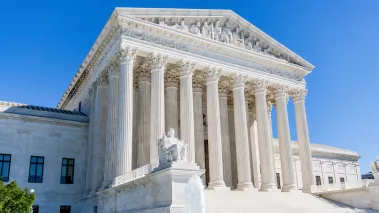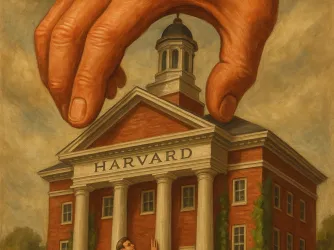Table of Contents
Supreme Court campaign finance decision favors an open marketplace of ideas

davidsmith520 / Shutterstock.com
Today the Supreme Court issued its highly anticipated opinion in Citizens United v. Federal Election Commission, No. 08-205, slip op. (Jan. 21, 2010), one of the more important First Amendment cases decided in the last several terms. The case involves campaign finance reform legislation, but its reasoning is directly applicable to speech issues on college campuses. In invalidating provisions of the Bipartisan Campaign Reform Act (BCRA), the Court in Citizens United reaffirms the importance of the "open marketplace of ideas" in our liberal democracy. The Court's ruling today also repudiates the view that certain speakers must be limited in their speech in order for the voices of others to be adequately heard.
Citizens United involves the production of a disparaging documentary about Senator Hillary Clinton by a nonprofit corporation, Citizens United, which wished to air the video before the 2008 presidential primary elections. The nonprofit sought a declaration that distributing the video would not violate the BCRA, which prohibits corporate expenditures on any communication about a political candidate that airs 30 days before a federal election.
Justice Kennedy's majority opinion held that the BCRA violated the First Amendment insofar as it banned political speech based on the corporate identity of the speaker. According to the Court, the government cannot exclude a certain class of speakers from political debate. Although even under the BCRA corporations may set up separate Political Action Committees to fund "electioneering communications" using money from shareholders who wish to contribute, the Court found this process too burdensome on corporations. Under Citizens United, corporations are now permitted to use shareholder money to directly advocate for a candidate through campaign expenditures. However, Citizens United did not overrule prior cases limiting direct contributions to candidates. It also upheld the BCRA's disclosure provisions, requiring that the source of the electioneering communication be named during the communication.
In overturning the BCRA's expenditure limitations, the Court took the dramatic step of overruling the prior Supreme Court case of Austin v. Michigan Chamber of Commerce, 494 U.S. 652 (1990), which had upheld campaign finance provisions similar to the BCRA. The Court in Citizens United disavowed the reasoning in Austin that the government had a compelling interest in "antidistortion" of political speech. Thus, Citizens United repudiated Austin's logic that certain speakers can be considered "too powerful" based on "the corrosive and distorting effects of immense aggregations of wealth." The Court thus explained that "Austin interferes with the ‘open marketplace' of ideas protected by the First Amendment."
How, you may ask, does the Court's interpretation of the First Amendment as prohibiting the government from suppressing certain speech in order to silence speakers who are "too powerful" relate to FIRE? The relevance lies in the fact that universities and scholars often use a similar "antidistortion" rationale in advocating for speech codes that prohibit offensive or derogatory speech, especially when those codes concern sensitive or controversial topics. The finding in Citizens United removes a great deal of the support for their view that certain speakers and certain messages should be silenced in order to allow others to feel more comfortable speaking. Although courts already consistently overturn speech codes, Citizens United bolsters the view that the First Amendment does not permit such favoritism among speakers or undue interference with the marketplace of ideas, and that is likely to pay dividends down the road for liberty on campus.
Recent Articles
FIRE’s award-winning Newsdesk covers the free speech news you need to stay informed.

FAQ: Responding to common questions about the fight between Harvard and the Trump administration

George Mason University calls cops on student for article criticizing Trump

Trump administration's coercion at Columbia is unlawful and unconstitutional
